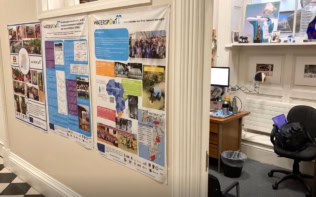New measures to combat the under representation of women in UK physics are contained in a report being launched today. The report, written by a team of senior female physicists, sets out a series of recommendations designed to improve the career prospects of women physicists at all ages – from school girls to university professors. Led by Gillian Gehring of Sheffield University, the report follows up on a wide range of resolutions agreed upon at an international conference held on the issue earlier this year.
Although the number of female physicists has increased over recent decades, women make up only about 20% of UK physics undergraduates and are considerably less well represented within higher academic positions. To tackle these shortages, the first global meeting on women in physics was held earlier this year by the International Union of Pure and Applied Physics. Today’s report, entitled “Women physicists speak”, sets out how the resolutions from the international conference can be applied specifically to the UK.
The report contains a number of recommendations relating to universities. It says that “if there is to be a qualitative change in the participation of women in physics and astronomy, attitudes of mind and procedures in university departments need to change.” In particular it says that women need carefully tailored advice on their career development as they are unlikely to have older female colleagues to provide informal advice.
The report goes on to say that university vice-chancellors should appoint women to senior positions “in the same proportion as they are represented on university staff, recognizing that women have much to offer that may be different from men.” There should be an established career path for women who work part time or return to work after a break, while men should have the option to work fewer hours in order to undertake childcare. Vice-chancellors must make sure that procedures for promotion and salary revision are transparent.
There are also a number of recommendations for funding bodies, learned societies, industry and government. The report says that the UK’s higher education funding councils need to ensure that the Research Assessment Exercise treats women fairly. As regards salaries, funding councils should justify inequalities between the sexes or take immediate action to raise the pay of women academics to that of men.
In a similar vein, research councils should ensure that their funding does not discriminate along gender lines and must monitor the fairness and objectivity of the peer review process. The report points out that women would particularly benefit if research councils adopt the improved pay and conditions for contract research workers recommended in the recent review by Sir Gareth Roberts.
The report says that the Institute of Physics and the Royal Astronomical Society should “regard the increased participation of women as part of their core strategy and offer an imaginative lead to the community”.
Meanwhile, industry should ensure it has available flexible working patterns, paid paternity and maternity leave, childcare facilities and technical training for those coming back to work. The government should promote more women to senior and policy-making positions.
The report also recommends that examination boards and schools should urgently introduce measures to increase the number of girls studying physics to A level and at university. It says that schools should use attractive careers materials to interest girls in the subject from an early age, “so that they are drawn in rather than feel pushed.”



